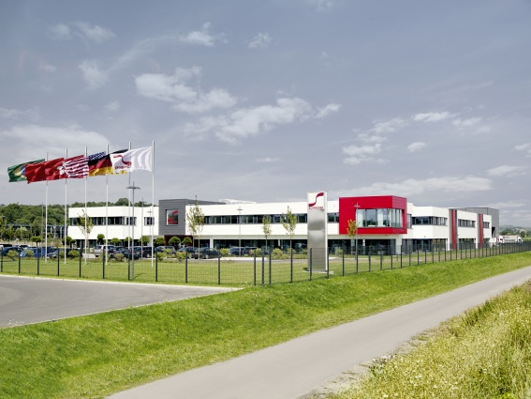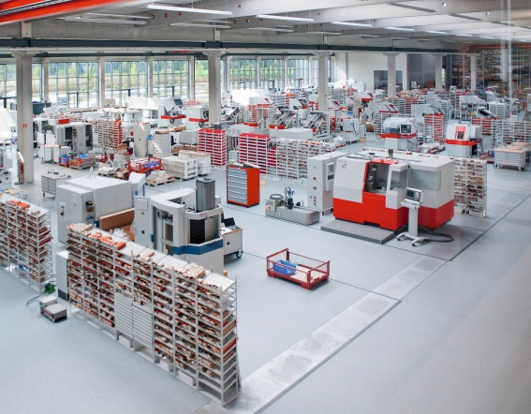Schneider automates Preference Certificates for Customs
EU agreements enable exporting companies to take advantage of significant tariff concessions, provided they supply a preference certificate documenting the EU origin of the goods for export. This is a highly complex, intricate process, particularly for the mechanical engineering industry. In response, the mid-sized company SCHNEIDER GmbH & Co. KG sought an IT solution that automates preference authorization management.
SCHNEIDER GmbH & Co. KG is an owner-operated company that is a world leader in the manufacture and development of machinery for the eyeglasses and precision optics industry. Due to the large number of components used in the company’s products, creating preference certificates is a highly complex process for SCHNEIDER. The company therefore began looking for an automated solution.

(Photos SCHNEIDER GmbH & Co. KG)
Manually prepared preference certificates are complex and susceptible to errors
The origin of all articles purchased from EU countries must be verified by supplier declarations, and the share of EU-based input materials must be calculated in an understandable way and documented. This means that the supplier declarations have to be requested from the suppliers, and then the declarations must be inspected and the supplier has to be informed of any issues with them. The process is even more complex for self-manufactured components. The material data from the production orders and the parts lists must be inspected for any third-party parts used, and their proportional value must be determined for the preference calculation. Depending on the applicable customs agreement, different regulations can apply for the calculation of the goods origin and for the preference declarations.
“We previously did all of this work completely manually, and managed the additionally purchased materials via Excel lists. For the preference calculation we inspected and assessed every single item. In addition, we also had to clarify whether a supplier declaration was on hand for the third-party parts and if so, whether it was still valid. Finally, we would enter the supplier declarations into the SAP system as PDF files”, says Thorsten Schwing, Manager Import/Export & Purchasing at SCHNEIDER in explaining the processing procedure. He continues, “The entire procedure required the cooperation of several departments and was conducted for the most part separately from the SAP system. The time this required for a machine with 5,000 parts for example was enormous, and the process was also susceptible to errors”. Yet another requirement is the random inspections regularly conducted by the customs authorities, which triggered a significant search effort for the documentation and certificates each time.
Requirements for an IT solution
SCHNEIDER’s aim was to replace the manual procurement and management of supplier declarations and the calculation of preference authorizations with an IT solution. Five primary requirements had to be taken into consideration:
- Reducing costs: The desired IT solution should automate preference management.
- Conform with all legal requirements: The solution should fully comply with all customs requirements.
- Simplify operation: Operation should be easy and correspond with previous procedures.
- Be SAP-integrated: The solution should be integrated into SAP as the leading IT system.
- Avoid media disruptions: Data should no longer be managed in separate Excel lists.
“We searched the solutions available on the market and didn’t find anything suitable. The solutions either operated separately from the SAP system or they were designed for the needs of large companies, and were therefore incompatible with our budget. So we chose to work together with the company Roth Industries and our software partner Mercoline to expand the existing export clearance solution”, explains Thorsten Schwing.
Mercoline is a certified SAP partner specializing in IT solutions throughout the supply chain and offering process consultation and add-ons in the SAP environment.
Preference management was integrated into SAP ERP
The cooperation with Mercoline produced the solution “M.SecureTrade Preference Management”, which is integrated in SAP ERP. The solution extensively automates the determination of the preferential origin for sales materials. It ensures that with each new SAP sales document such as an invoice, the preference calculation of all the document’s material items is conducted automatically, including the calculation of the proportional value of EU-origin and non-EU-origin input materials. The solution can consider different kinds of parts lists and value determination procedures in the process . The software uses all of this to generate a Preference Calculation Document (PCD) featuring all of the calculation results for the material in question. Finally, an extensive monitoring function monitors all of the calculated materials and SAP documents with an overview of all preference authorized and non-preference authorized materials. Another advantage is that all EU preference agreements can be imported in the form of XML files, eliminating the necessity of related maintenance efforts. In addition, the solution enables company-specific customizing of the application. For example, information records from subsidiary companies needed for internal stock transfer orders can therefore be left out of the calculation.
One special element of this Mercoline solution is the electronic exchange of long-term supplier declarations via a web portal and automated processing in the SAP system. If something changes about the origin of input materials, for instance as a result of purchasing from other suppliers, the changes are updated in the SAP system and can be used shortly thereafter in the preference calculation.


Time savings of more than 90 percent
“Preference management is now largely automated, and as a result we have time savings of 90 to 95 percent. Now even with tight deadlines we can create a preference declaration on time. The solution is integrated into the SAP system, so our employees are comfortable using it. Its usability is very positive. The system of transactions, monitoring and inspection functions quickly enjoyed broad acceptance among our employees”, says SCHNEIDER Export Manager Mr. Schwing in summarizing the benefits of the new solution. He also emphasizes the practical implementation of the program by Mercoline, the assured legal compatibility it achieves and the easy provision of documentation for customs inspections. And ultimately, sales also profit from the solution. Mr. Schwing concludes, “Now we can already make a preliminary statement to a customer in the sales discussion for a particular machine. This makes the export of our products even simpler”.
About SCHNEIDER GmbH & Co. KG
Owner-operated SCHNEIDER GmbH & Co. KG is one of the world’s leading companies in the manufacture and development of machinery for the eyeglasses and precision optics industry. Its solutions include the fabrication of CNC-controlled optics machinery for precision optics, fully automated system solutions for the eyeglass lens industry and ultra-precision machinery for the manufacture of complex 3D surfaces. Along with one development and four production facilities in Germany, SCHNEIDER also has branch operations in the USA, Brazil, Hong Kong, Thailand and China.